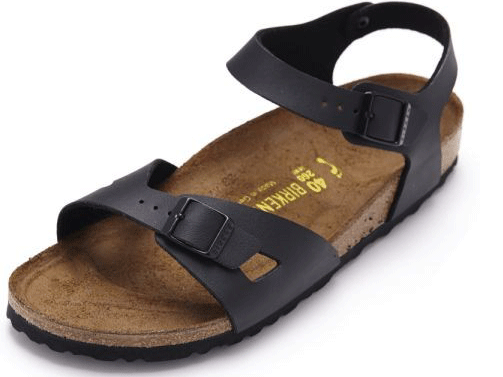Birkenstock to remove its shoes from Amazon because of counterfeit sellers
The company is planning to remove its popular sandals from Amazon from 1 January next year

Your support helps us to tell the story
From reproductive rights to climate change to Big Tech, The Independent is on the ground when the story is developing. Whether it's investigating the financials of Elon Musk's pro-Trump PAC or producing our latest documentary, 'The A Word', which shines a light on the American women fighting for reproductive rights, we know how important it is to parse out the facts from the messaging.
At such a critical moment in US history, we need reporters on the ground. Your donation allows us to keep sending journalists to speak to both sides of the story.
The Independent is trusted by Americans across the entire political spectrum. And unlike many other quality news outlets, we choose not to lock Americans out of our reporting and analysis with paywalls. We believe quality journalism should be available to everyone, paid for by those who can afford it.
Your support makes all the difference.Birkenstock, the maker of comfortable sandals, has decided to remove its products from Amazon in protest against the online retailer’s lax policies on counterfeiting.
The German footwear company said Amazon’s “unacceptable” business practices jeopardise the brand. The company is planning to remove its iconic sandals from Amazon starting from 1 January next year.
David Kahan, chief executive of Birkenstock US, explained the company's position to retail partners in an internal memo first seen by CNBC.
A spokesman for Birkenstock US confirmed the report but declined to comment further.
“The Amazon marketplace, which operates as an open market, creates an environment where we experience unacceptable business practices which we believe jeopardise our brand. This includes postings by sellers proven to have counterfeit Birkenstock products,“ Kahan wrote.
“It also includes a constant stream of unidentifiable unauthorised sellers who show a blatant disregard for our pricing policies. Policing this activity internally and in partnership with Amazon.com has proven impossible,” he added.
Kahan added that Birkenstock will no longer authorise third-party merchants to sell on the site, either.
Many Birkenstock listings on Amazon are priced $20 below its traditional price. Kahan told customers to beware and buy Birkenstock products from authorised retailers only.
Amazon previously denied reports that the amount of Chinese counterfeit products on its website was growing.
“Amazon does not allow the sale of inauthentic items on its marketplace and occurrences of inauthentic products are rare. Every customer who orders on Amazon is covered by our A-Z guarantee – if they do received inauthentic goods, we will refund or replace that item,” a spokesperson for Amazon, said in a statement.
The Independent has contacted Amazon UK for additional comment.
Amazon is not the only retailer plagued by counterfeit goods. Jack Ma, the chairman of Alibaba recently caused a stir when he suggested that fake goods were often “better than branded products”.
Alibaba, China’s biggest online retailer, has been strongly criticised for failing to do enough to stop counterfeit goods being sold on platforms such as Taobao.
The counterfeit trade is booming with nearly half a trillion dollars in fake goods sold each year, according to a research out in April this year.
Fake goods now make up 2.5 per cent of all international trade, according to the research, which was conducted by the Organisation for Economic Cooperation and Development (OECD) and the European Observatory on Infringements of Intellectual Property Rights. They based their analysis on half a million customs seizures around the world from 2011 to 2013.
Counterfeiting also produces copies that endanger lives from auto parts that fail, to toys that harm children and medical instruments that deliver false readings, the report warned.
The situation has worsened since 2008, when a similar study estimated that up to 1.9 per cent of global imports were fakes.
Doug Frantz, the OECD deputy secretary general, said counterfeiters not only hurt big companies and luxury goods manufacturers but take advantage of customers' trust.
Join our commenting forum
Join thought-provoking conversations, follow other Independent readers and see their replies
Comments